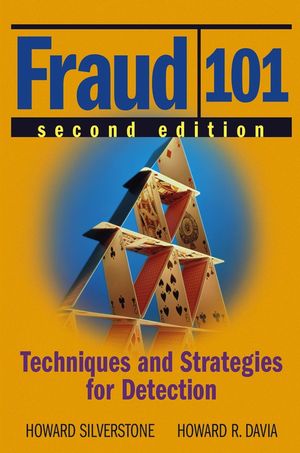Fraud 101 Summary
4 min read ⌚
 Techniques and Strategies for Detection
Techniques and Strategies for Detection
Fraud has always been present. However, in the past years, it has spread all over the business world, including large companies.
So how can you make sure that your company avoids being a victim of fraud?
Start by reading our summary “Fraud 101” in which we will cover most of the terms that the book offers. You will learn the kinds of fraud, the difference between auditors and criminal investigators, and the changes in fraud targets that occurred during the past years.
Prevention is better than cure. So, we advise you to read on.
Who Should Read “Fraud 101”? And Why?
According to authors Howard Silverstone and Howard R. Davia during recent years, fraud has moved from the margins of the business world to the core of it. In other words, it started appearing in the largest companies out there.
The cases of WorldCom and Enron prove the authors are right.
We recommend “Fraud 101” to every businessperson out there because you can never have taken too many precaution measures.
About Howard Silverstone and Howard R. Davia
 Howard M. Silverstone is the founder of a forensic accounting firm. He has written numerous articles on financial fraud.
Howard M. Silverstone is the founder of a forensic accounting firm. He has written numerous articles on financial fraud.
Howard R. Davia was an author and a certified public accountant.
“Fraud 101 Summary”
No business can entirely isolate itself from fraud.
In fact, companies that think they have immunity, give fraudsters a significant advantage.
Okay, so if that is the case, what makes fraud possible?
Although you may think that some people (or companies) are predetermined to fraud, circumstances are the ones that make fraud possible (or impossible).
For example, the current reform legislation focuses managerial attention on accepting that there is a risk of fraud, and implementing preventative controls and hiring practices.
A while ago, most of the cases of fraud happened in small companies. However, over the years, this has completely changed, and an increasing number of large corporations are a subject to fraudulent behavior.
To be more precise, frauds have gotten more prominent ever since 1997, when earning restatements increased to billions of dollars. Even large public companies got involved in fraud, a fact that now influences almost all industries.
What about fraud victims? What are the costs they bear?
Well, money losses are, believe it or not, the smallest problem. Victims suffer from both direct and indirect costs. When we mention direct costs we talk about the cash lost because of fraud. Indirect costs, on the other hand, can be much more significant. They include job losses, bankruptcies, investors’ losses, and even destroyed communities.
There are three kinds of fraud fighters: criminal investigators, internal and external auditors. We know, they all seem the same to you. So next, we talk about the differences between them.
Criminal investigators are reactive; they are sure that fraud has occurred, and work to gather enough evidence to prosecute a criminal case. Auditors, on the other hand, are proactive and approach their jobs knowing that fraud is possible, but are not judgemental about whether it has occurred.
Sadly, auditors miss fraudulent behavior for many reasons.
First, they may misunderstand the difference between an audit and a fraud investigation. They may be unable to grasp their responsibilities. Furthermore, they may fail to get enough evidence during their inquiries.
They may even face management that has done whatever it could to conceal the fraud.
An audit has the purpose of finding reasonable assurance that a company’s financial statements do not contain material corrections. Hence, audits’ scope is limited, and auditors approach their work assuming that management is honest.
Investigators, on the other hand, begin with a higher dose of skepticism about it all.
Key Lessons from “Fraud 101”
1. Mistakes Companies Make that Help Perpetrators of Fraud
2. Stages of Fraud Investigation
3. Most Important Types of Fraud
Mistakes Companies Make that Help Perpetrators of Fraud
-
- Failure to eliminate conflicts of interest in contracts or to segregate responsibilities.
-
- Failure to keep careful track of money expenditures.
-
- Failure to reconcile accounts.
- Failure to give auditors and fraud investigators enough resources.
Stages of Fraud Investigation
- Identify the fraud: search for indicators of the fraud. Once you identify what kind of fraud is in question, choose a relevant transaction and examine all of the documentation connected to it. Track it to its source. If the deal you picked does not show signs of fraud, pick another one and continue the process.
- Investigate: some types of fraud are hard to discover by merely studying documents. To search these kinds of fraud, you may have to investigate by other means.
- Gather evidence: When you gather evidence, keep the findings discreet.
Most Important Types of Fraud
-
- Duplicate payment fraud
-
- Multiple payee frauds
-
- Shell fraud
-
- Defective delivery fraud
-
- Defective shipment fraud
- Defective pricing fraud
Like this summary? We’d Like to invite you to download our free 12 min app, for more amazing summaries and audiobooks.
“Fraud 101” Quotes
The objective of a fraud investigation is to make an absolute determination about whether fraud exists, regardless of whether it is material or immaterial. Click To Tweet An effective internal audit function, with adequate staff to carry it out, is an essential part of any internal control system. Click To Tweet In almost all instances where contract rigging fraud is suspected, contract changes are the keys to the perpetrator’s success. Click To Tweet”Perpetration Click To Tweet the appearance of legitimacy.” username=”get12min”]
Remember, fraud is first and foremost committed by people, and no amount of internal controls will ever completely remove fraud from a business. Click To TweetOur Critical Review
In “Fraud 101” they categorize and explain the different types of fraud, as well as the circumstances that make them possible.
They fill the pages with anecdotes, which makes the book not only intelligible and accessible but also entertaining.
Emir is the Head of Marketing at 12min. In his spare time, he loves to meditate and play soccer.


 Techniques and Strategies for Detection
Techniques and Strategies for Detection




